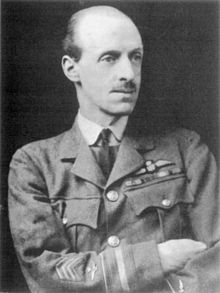Sir Frederick Sykes | |
|---|---|
 Major General Frederick Sykes c. 1918 | |
| Born | 23 July 1877 Addiscombe, Surrey, England |
| Died | 30 September 1954 (aged 77) London, England |
| Allegiance | United Kingdom |
| Service | British Army (1899–18) Royal Air Force (1918–19) |
| Years of service | 1899–1919 |
| Rank | Air Vice-Marshal |
| Commands | Chief of the Air Staff (1918–19) RNAS Eastern Mediterranean (1915–16) Military Wing of the Royal Flying Corps (1912–14) |
| Battles / wars | Second Boer War First World War |
| Awards | Knight Grand Commander of the Order of the Star of India Knight Grand Commander of the Order of the Indian Empire Knight Grand Cross of the Order of the British Empire Knight Commander of the Order of the Bath Companion of the Order of St Michael and St George Mentioned in Despatches (2) Order of Saint Vladimir, 4th Class (Russia) Commander of the Order of Leopold (Belgium) Distinguished Service Medal (United States) Commander of the Legion of Honour (France) Order of the Rising Sun, 2nd Class (Japan) |
| Other work | Statesman, politician |
Air Vice Marshal Sir Frederick Hugh Sykes, GCSI, GCIE, GBE, KCB, CMG (23 July 1877 – 30 September 1954) was a British military officer and politician.
Sykes was a junior officer in the 15th Hussars before becoming interested in military aviation. He was the first Officer Commanding the Military Wing of the Royal Flying Corps before the First World War, and later served as the Flying Corps' Chief of Staff in France in 1914 and 1915. Later in the war, he served in the Royal Naval Air Service in the Eastern Mediterranean before returning to Great Britain where he worked to organise the Machine Gun Corps and manpower planning. In late 1917 and early 1918, Sykes was the deputy to General Wilson on the Supreme War Council and from April 1918 to early 1919 he served as the second Chief of the Air Staff.
After the war, Sykes was appointed the Controller of Civil Aviation and he continued in this role until 1922 when he entered politics, becoming the Conservative MP for Sheffield Hallam, which he held until 1928 when he resigned. From 1928 to 1931 he was Governor of Bombay, after which time he returned to Great Britain where he involved himself in business and public life. During the Second World War, Sykes was an MP once more, this time for Central Nottingham. He lost his seat in 1945 and he died nine years later.